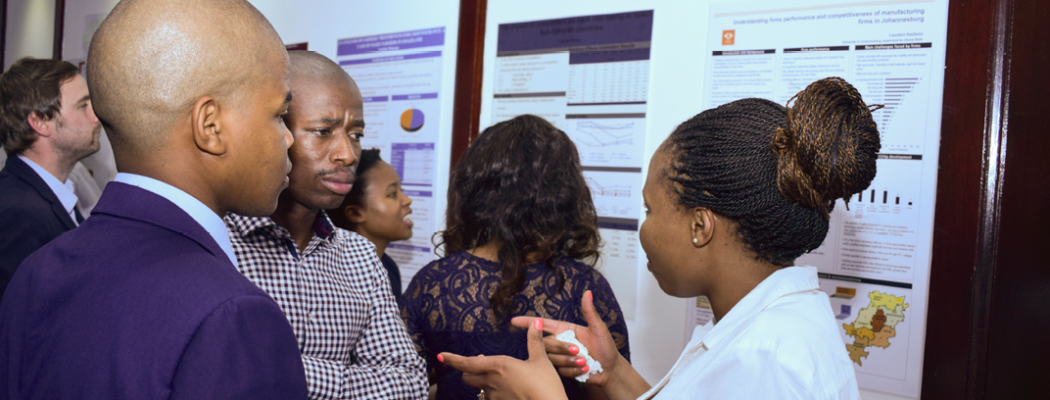Enterprise development for job creation and growth
Background
United Nations University World Institute for Development Economics Research (UNU-WIDER) is implementing over the period 2017–20 a research programme entitled Southern Africa – Toward Inclusive Economic Development (SA-TIED). The aim of the programme is to enhance economic research, capacity-building, and policy dialogue in South Africa and the Southern African region.
This request is for research proposals that will advance the SA-TIED programme’s work on enterprise development for job creation and growth. The recent availability of South African tax administrative datasets for research purposes creates new opportunities for policy-relevant, evidence-based research on questions about private sector development, firm behaviour, job creation, and productivity.
Internationally, research using tax administrative data has been key to informing well-designed tax and labour market policies, industrial policy, appropriate redistributive social expenditure programmes, and broader strategies to promote private sector development and inclusive growth.
Until recently, researchers working on South Africa have lacked the requisite data to truly support good policy-making in this arena. This request for proposals invites the research community to join UNU-WIDER and its partners in the important process of generating evidence based on this newly available data.
Offer
UNU-WIDER, the National Treasury of the Republic of South Africa (NT), and the South African Revenue Service (SARS) invite proposals from qualified researchers for detailed economic analysis and research of topics in enterprise development for job creation and growth. Researchers are encouraged to use the new administrative datasets in their research, but applied work based on other data will also be considered. Special emphasis will be given to research teams that include junior and early-career researchers.
In addition to generating policy-relevant research, one of the objectives of this request is to facilitate policy dialogue by engaging with researchers on policy-relevant issues. Special efforts are undertaken to ensure that that the findings from this research are communicated effectively to all stakeholders — including the academic community, policy makers, and civil society via policy summaries and dialogue.
Proposals from individuals, groups of individuals, and non-profit organizations are welcome.
Researchers can be based in South Africa or internationally, and can combine researchers from different countries and institutions. Researcher(s) with successful proposals will gain access to generally inaccessible tax administrative datasets at NT, subject to agreed restrictions to preserve confidentiality.
Important note on access to datasets:
All the data has been anonymised in line with global best practice. Access to these datasets is only available physically at the National Treasury Secure Data Lab in Pretoria, South Africa. Data analysis may only be conducted in this facility and no datasets can be removed from the facility. A data orientation session will be organised for researchers at the start of the contract.
For detailed information about the firm-level and individual-level data available please visit here.
What is expected of researchers
All successful applicants will be expected to:
- Produce a relevant research paper of sufficient quality to merit publication in the WIDER Working Paper series. Previous papers using the tax data and topics previously explored can be found here. Ongoing research using the tax data can be found here. Please review these studies to avoid duplication of research.
- Include in the research paper a data appendix of datasets and variables used.
- Sign agreements and abide by all restrictions imposed by SARS, NT, and other government agencies with respect to disclosure of confidential firm and individual-specific information.
- Attend a 1–1.5-day workshop in South Africa (venue TBA) where work in progress will be presented to other contracted researchers and to select international experts.
- Be flexible in research approach, particularly for those researchers planning on exploiting datasets that have been lightly analysed to date.
- Please note: UNU-WIDER only commissions original research which has not been published elsewhere. To ensure the quality and originality of research, all submitted studies are analysed with the iThenticate software at the first deliverable stage and prior to publication.
Dates
30 June 2019 | Final opportunity for questions on the request for research proposals |
| Proposals due |
15 August 2019 | Target date for informing on final decisions |
30 September 2019 | Target date for completion of necessary administrative procedures |
30 October 2019 | Target date for workplan due |
30 November 2019 | Target window for submission of first drafts of papers |
December 2019 | Work-in-progress workshop |
August 2020 | Target window for submission of final papers |
Proposal submission details
Submission of proposals is done electronically using one of the forms in the sidebar. There are three forms to select from: one for individuals, another for groups of individuals, and a third one for non-profit institutions. Details (such as address, gender, nationality, date of birth) of all researchers involved are required to complete the form. Upload the proposal and brief CVs (two pages or less) for each researcher. Please familiarize yourself with the form in advance of applying.
The technical proposal should be no more than five pages (A4) in length, excluding cover page and references, using 12-point font, 1.5 line spacing, and standard margins. The cover page should contain the complete contact information of each researcher and a 200-word proposal abstract which should summarize the research question, main methods, data, and expected contribution to the policy debate.
Submission of a budget is not required for the proposal.
Any questions on the proposal process should be sent to researchproposal6@wider.unu.edu by 30 June 2019. All queries and responses will be published on the RFRP announcement page after this date.
See full Request for Research Proposals





